人教版八年级上册Unit 5 Do you want to watch a game show-Section A 1 课件(共28张PPT)
文档属性
| 名称 | 人教版八年级上册Unit 5 Do you want to watch a game show-Section A 1 课件(共28张PPT) |  | |
| 格式 | ppt | ||
| 文件大小 | 6.0MB | ||
| 资源类型 | 教案 | ||
| 版本资源 | 人教新目标(Go for it)版 | ||
| 科目 | 英语 | ||
| 更新时间 | 2023-02-03 14:40:20 | ||
图片预览

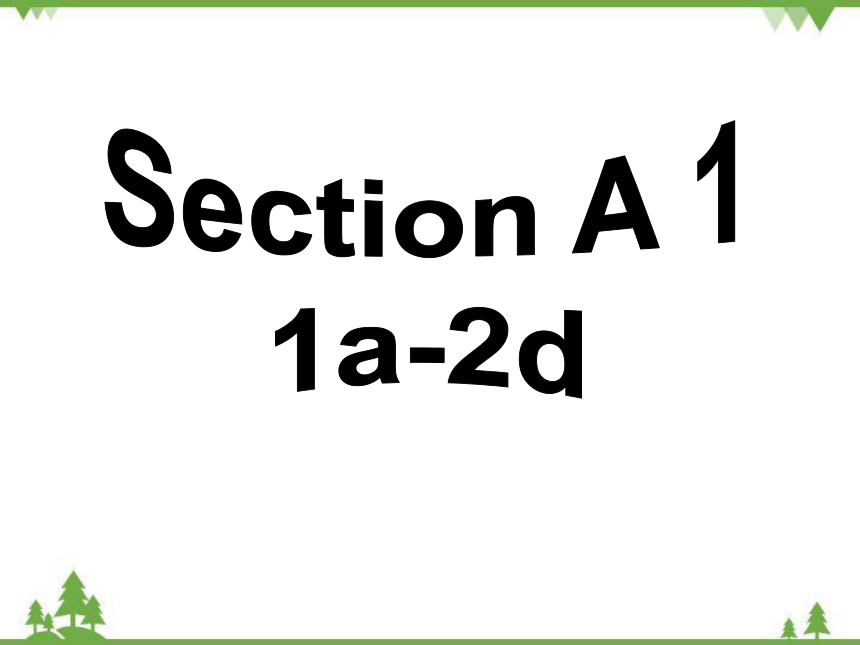


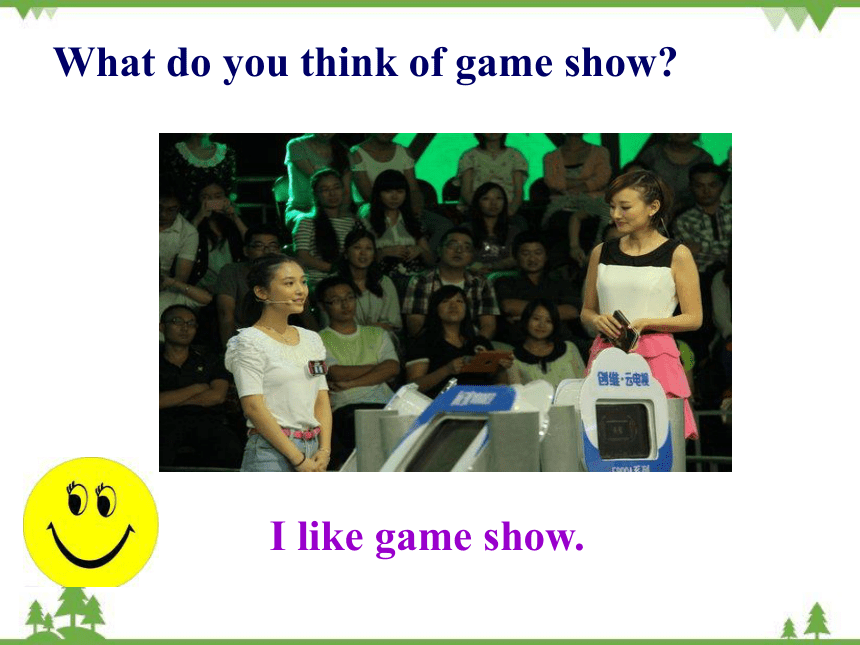
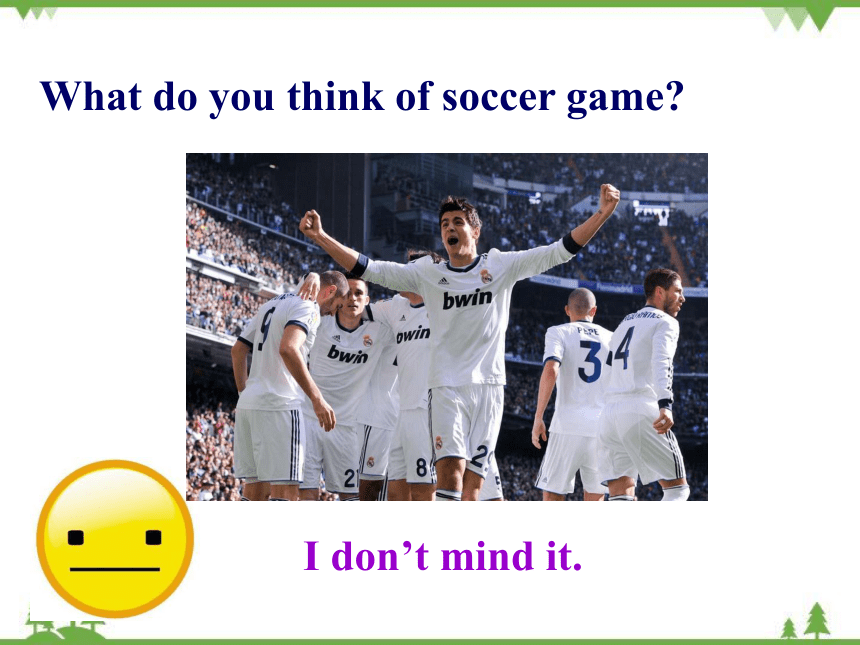
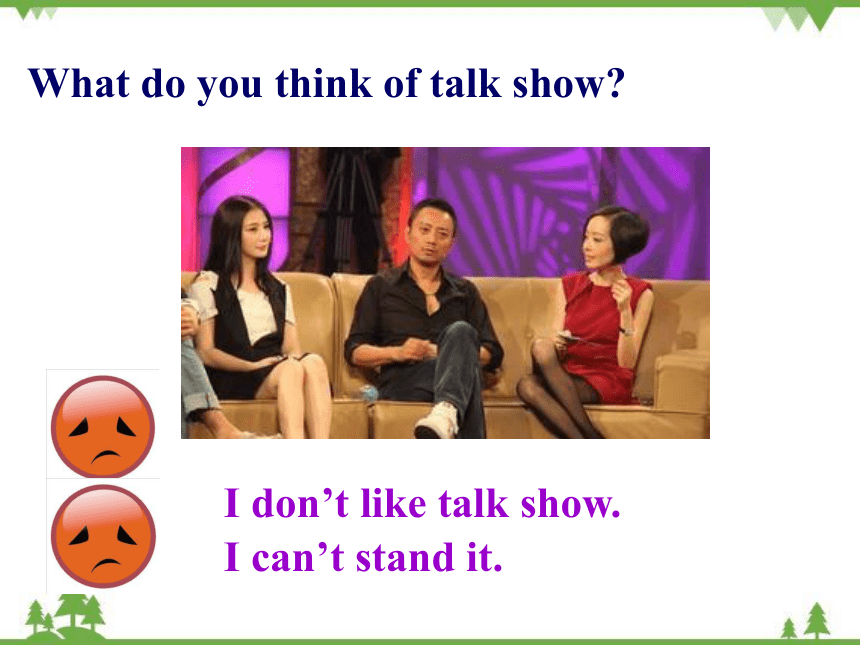

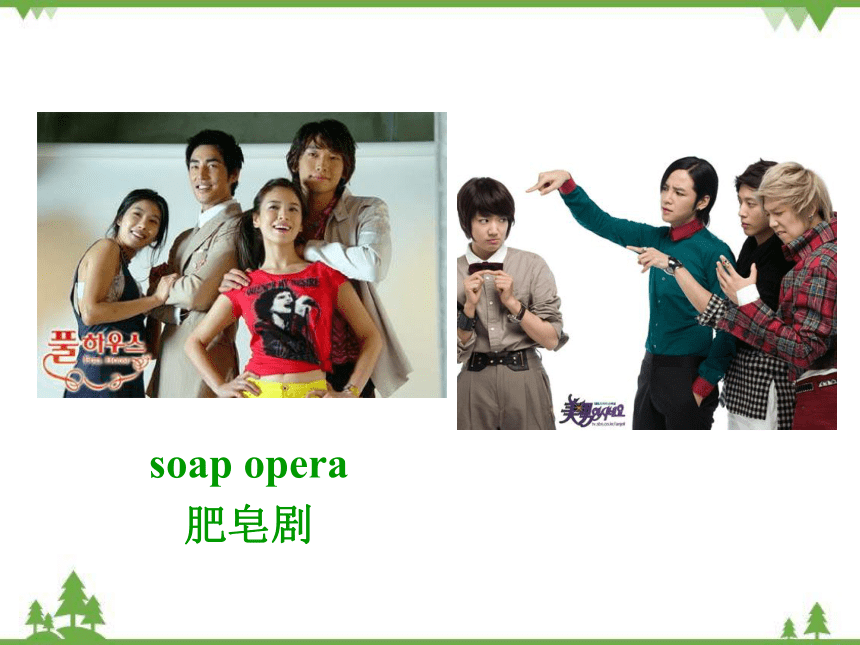
文档简介
(共28张PPT)
What’s your favorite programme
Do you like to watch TV
What do you think of talent show
I love talent show.
What do you think of game show
I like game show.
I don’t mind it.
What do you think of soccer game
I don’t like talk show.
What do you think of talk show
I can’t stand it.
sitcom
n. 情景喜剧
news
n. 新闻节目; 新闻
soap opera
肥皂剧
Guess! What does your partner want to watch
Match the TV shows with the pictures [a-g].
1a
1. talk show ___ 2. soap opera ___
3. sports show ___ 4. sitcom ___
5. game show ___ 6. talent show ___
7. news ___
d
e
b
c
a
g
f
__ talent show __ talk show
__ soccer game __ news
Listen and number the shows [1-4] in the order you hear them.
1b
1
2
3
4
What do you want to watch
What do you think of talk show
1c
They’re OK. I don’t mind them.
Then let’s watch a talk show.
What do you want to watch
What do you think of sports show
Oh, I can’t stand it.
Well, what about sitcom
OK. I like it.
Listen to Lin Hui and Sally’s conversation. Number the TV shows [1-5] in the order you hear them.
2a
___ sitcoms ____ news
___ game shows ____ talk shows
___ soap operas
2
1
5
3
4
1. Sally likes to watch ________________.
2. Lin Hui thinks she can learn ______ ___________ from sitcoms.
3. Sally thinks ___________ are more educational than sitcoms.
4. Sally loves __________. She plans to watch Days of Our Past _______.
news or talk shows
some
game shows
soap operas
Listen again. Complete the sentences.
tonight
great jokes
2b
Ask and answer questions about the TV shows in 2a. Use information that is true for you.
Do you plan to watch the news tonight
Yes. I like watching the news. I watch it every night.
2c
Why
Because I hope to find out what’s going on around the world.
Do you want to watch game shows
Yes. I like watching game shows. I watch them three times a week.
Why
Because I …
1. educational adj. 教育的;有教育意义的
education (教育) + al → educational; 多音节形容词,其比较级及最高级形式在其前加more,most构成。
e.g. I think this movie is the
most educational.
我认为这部电影最有教育意义。
2. plan v. & n. 打算; 计划
e.g. What’s your trip plan
你们的旅行计划是什么?
plan to do sth. 计划/打算做某事
e.g. We plan to have a birthday party for Mary.
我们打算为玛丽举办一个
生日聚会。
3. hope v. & n. 希望
e.g. Don’t lose your hope!
不要灰心!
hope to do sth. 希望做某事 (能实现的理想)
e.g. They hope to take the
plane to Beijing next year.
他们希望来年乘飞机去北京。
4. find out 查明; 弄清 (指通过调查、研究
等方式查明事情的真相)
e.g. Did they find out where the old man lived
他们查明那位老人住在哪里了吗?
辨析: find 意为“找到;发现”,强调动作的结果。
e.g. Mr. Li found his lost keys in the library. 李老师在图书馆里找到了他丢失的钥匙。
Grace
Sarah
Grace’s classmates
2d
Read the conversation and match the persons with their favourite shows.
soap operas
game shows and sports shows
news and talk shows
What did you do in class today, …
We had a discussion about TV shows. …
1. discussion n. 讨论; 商量
动词 discuss (讨论) + ion→ discussion
e.g. Let’s discuss who is the best performer. 让我们讨论一下谁是最好的表演者。
Did you have a discussion about the food and drinks
他们讨论过食物和饮料的事了吗?
2. stand v. 忍受; 站立
e.g. Li Fei can stand on his head.
李飞会倒立。
3. happen v. 发生; 出现
My aunt can’t stand soap operas.
我姑姑不能忍受肥皂剧。
不及物动词,后面不能跟宾语,常用 “事情/事物 + happen +(状语)”句式。
e.g. The story happened in 1997.
故事发生在1997年。
4. may model v. 也许; 可以; 可能
e.g. You may go by bike or take the subway.
你们可以骑自行车去或乘地铁去。
“may + 动词原形”一起构成句子的谓语。
5. expect v. 预料; 期待
expect to do sth. 期盼做某事
e.g. Jack expects to visit his grandparents this weekend. 杰克期望周末去看望他的祖父母。
用下列词组来造句:
1. plan to … 2. hope to …
3. find out … 4. can’t stand …
5. sth. happen 6. expect to …
What’s your favorite programme
Do you like to watch TV
What do you think of talent show
I love talent show.
What do you think of game show
I like game show.
I don’t mind it.
What do you think of soccer game
I don’t like talk show.
What do you think of talk show
I can’t stand it.
sitcom
n. 情景喜剧
news
n. 新闻节目; 新闻
soap opera
肥皂剧
Guess! What does your partner want to watch
Match the TV shows with the pictures [a-g].
1a
1. talk show ___ 2. soap opera ___
3. sports show ___ 4. sitcom ___
5. game show ___ 6. talent show ___
7. news ___
d
e
b
c
a
g
f
__ talent show __ talk show
__ soccer game __ news
Listen and number the shows [1-4] in the order you hear them.
1b
1
2
3
4
What do you want to watch
What do you think of talk show
1c
They’re OK. I don’t mind them.
Then let’s watch a talk show.
What do you want to watch
What do you think of sports show
Oh, I can’t stand it.
Well, what about sitcom
OK. I like it.
Listen to Lin Hui and Sally’s conversation. Number the TV shows [1-5] in the order you hear them.
2a
___ sitcoms ____ news
___ game shows ____ talk shows
___ soap operas
2
1
5
3
4
1. Sally likes to watch ________________.
2. Lin Hui thinks she can learn ______ ___________ from sitcoms.
3. Sally thinks ___________ are more educational than sitcoms.
4. Sally loves __________. She plans to watch Days of Our Past _______.
news or talk shows
some
game shows
soap operas
Listen again. Complete the sentences.
tonight
great jokes
2b
Ask and answer questions about the TV shows in 2a. Use information that is true for you.
Do you plan to watch the news tonight
Yes. I like watching the news. I watch it every night.
2c
Why
Because I hope to find out what’s going on around the world.
Do you want to watch game shows
Yes. I like watching game shows. I watch them three times a week.
Why
Because I …
1. educational adj. 教育的;有教育意义的
education (教育) + al → educational; 多音节形容词,其比较级及最高级形式在其前加more,most构成。
e.g. I think this movie is the
most educational.
我认为这部电影最有教育意义。
2. plan v. & n. 打算; 计划
e.g. What’s your trip plan
你们的旅行计划是什么?
plan to do sth. 计划/打算做某事
e.g. We plan to have a birthday party for Mary.
我们打算为玛丽举办一个
生日聚会。
3. hope v. & n. 希望
e.g. Don’t lose your hope!
不要灰心!
hope to do sth. 希望做某事 (能实现的理想)
e.g. They hope to take the
plane to Beijing next year.
他们希望来年乘飞机去北京。
4. find out 查明; 弄清 (指通过调查、研究
等方式查明事情的真相)
e.g. Did they find out where the old man lived
他们查明那位老人住在哪里了吗?
辨析: find 意为“找到;发现”,强调动作的结果。
e.g. Mr. Li found his lost keys in the library. 李老师在图书馆里找到了他丢失的钥匙。
Grace
Sarah
Grace’s classmates
2d
Read the conversation and match the persons with their favourite shows.
soap operas
game shows and sports shows
news and talk shows
What did you do in class today, …
We had a discussion about TV shows. …
1. discussion n. 讨论; 商量
动词 discuss (讨论) + ion→ discussion
e.g. Let’s discuss who is the best performer. 让我们讨论一下谁是最好的表演者。
Did you have a discussion about the food and drinks
他们讨论过食物和饮料的事了吗?
2. stand v. 忍受; 站立
e.g. Li Fei can stand on his head.
李飞会倒立。
3. happen v. 发生; 出现
My aunt can’t stand soap operas.
我姑姑不能忍受肥皂剧。
不及物动词,后面不能跟宾语,常用 “事情/事物 + happen +(状语)”句式。
e.g. The story happened in 1997.
故事发生在1997年。
4. may model v. 也许; 可以; 可能
e.g. You may go by bike or take the subway.
你们可以骑自行车去或乘地铁去。
“may + 动词原形”一起构成句子的谓语。
5. expect v. 预料; 期待
expect to do sth. 期盼做某事
e.g. Jack expects to visit his grandparents this weekend. 杰克期望周末去看望他的祖父母。
用下列词组来造句:
1. plan to … 2. hope to …
3. find out … 4. can’t stand …
5. sth. happen 6. expect to …
同课章节目录
- Unit 1 Where did you go on vacation?
- Section A
- Section B
- Unit 2 How often do you exercise?
- Section A
- Section B
- Unit 3 I'm more outgoing than my sister.
- Section A
- Section B
- Unit 4 What's the best movie theater?
- Section A
- Section B
- Unit 5 Do you want to watch a game show?
- Section A
- Section B
- Unit 6 I'm going to study computer science.
- Section A
- Section B
- Unit 7 Will people have robots?
- Section A
- Section B
- Unit 8 How do you make a banana milk shake?
- Section A
- Section B
- Unit 9 Can you come to my party?
- Section A
- Section B
- Unit 10 If you go to the party, you'll have a grea
- Section A
- Section B
